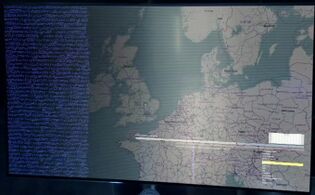Western Europe: Difference between revisions
No edit summary Tag: 2017 source edit |
|||
| (5 intermediate revisions by the same user not shown) | |||
| Line 1: | Line 1: | ||
{{First pic|K9 Bounty Hunter map 1.jpg|[[The Department]]'s digital map of north western Europe in [[2050]]. ([[TV]]: ''[[The Bounty Hunter (TV story)|The Bounty Hunter]]'')}} | {{First pic|K9 Bounty Hunter map 1.jpg|[[The Department]]'s digital map of north western Europe in [[2050]]. ([[TV]]: ''[[The Bounty Hunter (TV story)|The Bounty Hunter]]'')}} | ||
{{Wikipediainfo}} | {{Wikipediainfo}} | ||
'''Western Europe''' was the [[west]]ern region of [[Europe]]. | |||
Charles I of France, also known as [[Charlemagne]] [[rule]]d the [[Frankish Empire]] for [[46 (number)|46]] [[year]]s until his [[death]] in [[814]], uniting | == History == | ||
During the [[Miocene]], [[geological]] activity in Western Europe blocked off what would be known as the [[Straits of Gibraltar]], sealing off the [[Mediterranean]], which dried up, leaving a [[salt]]y [[plain]]. Towards the end of the Miocene, the [[Atlantic]] broke through and refilled the [[Mediterranean basin|basin]] in a [[cataclysmic]] [[flood]]. ([[PROSE]]: {{cs|Prehistory Repeating Itself (feature)}}) | |||
Charles I of France, also known as [[Charlemagne]] [[rule]]d the [[Frankish Empire]] for [[46 (number)|46]] [[year]]s until his [[death]] in [[814]], uniting Western and [[Central Europe]] for the first time since the [[Roman Empire]]. His [[reign]] saw a [[renaissance]] in European [[culture]]: [[architecture]], [[art]], [[literature]] and [[music]] all flourished, while [[Medieval Latin]] developed as Europe's first [[common language]]. ([[PROSE]]: {{cs|The Time Traveller's Almanac (reference book)}}) | |||
The [[Sixth Doctor]] suggested that the [[flight path]] of a [[Vvormak ship]] took in Western Europe, allowing the [[German]]s to learn of it before it was shot down by [[Hurricane (airplane)|Hurricane]]s over [[Turelhampton]] on [[17 May]] [[1944]]. ([[PROSE]]: {{cs|The Shadow in the Glass (novel)}}) | |||
[[Plymouth]] had the largest [[naval dock]]s in Western Europe. ([[PROSE]]: {{cs|Doctor Who: The Encyclopedia (reference book)}}) | |||
In the [[2000s]], a [[NATO]] [[satellite]] covered Western Europe, including the [[British Isles]]. ([[TV]]: ''[[Warriors of Kudlak (TV story)|Warriors of Kudlak]]'') | |||
[[Category:European regions]] | [[Category:European regions]] | ||
[[Category:Locations from the real world]] | [[Category:Locations from the real world]] | ||
Latest revision as of 04:41, 4 November 2024
Western Europe was the western region of Europe.
History[[edit] | [edit source]]
During the Miocene, geological activity in Western Europe blocked off what would be known as the Straits of Gibraltar, sealing off the Mediterranean, which dried up, leaving a salty plain. Towards the end of the Miocene, the Atlantic broke through and refilled the basin in a cataclysmic flood. (PROSE: Prehistory Repeating Itself [+]Loading...["Prehistory Repeating Itself (feature)"])
Charles I of France, also known as Charlemagne ruled the Frankish Empire for 46 years until his death in 814, uniting Western and Central Europe for the first time since the Roman Empire. His reign saw a renaissance in European culture: architecture, art, literature and music all flourished, while Medieval Latin developed as Europe's first common language. (PROSE: The Time Traveller's Almanac [+]Loading...["The Time Traveller's Almanac (reference book)"])
The Sixth Doctor suggested that the flight path of a Vvormak ship took in Western Europe, allowing the Germans to learn of it before it was shot down by Hurricanes over Turelhampton on 17 May 1944. (PROSE: The Shadow in the Glass [+]Loading...["The Shadow in the Glass (novel)"])
Plymouth had the largest naval docks in Western Europe. (PROSE: Doctor Who: The Encyclopedia [+]Loading...["Doctor Who: The Encyclopedia (reference book)"])
In the 2000s, a NATO satellite covered Western Europe, including the British Isles. (TV: Warriors of Kudlak)

